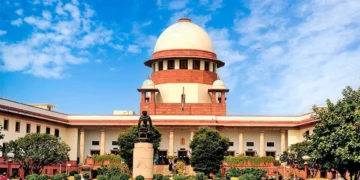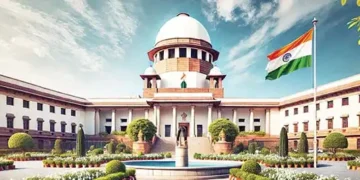Blitz Bureau
In a significant ruling, the Supreme Court has held that it is the fundamental right of every person arrested to be informed of the grounds of arrest as soon as possible. The Supreme Court has ruled that a spouse whose marriage has been declared void under the Hindu Marriage Act is entitled to seek permanent alimony or maintenance from the other spouse.
Even if a court comes to a prima facie conclusion that the marriage between the parties is void or voidable, pending the final disposal of the proceeding under the Hindu Marriage Act, the matrimonial court is not precluded from granting maintenance pendente lite, it said.
In view of the conflicting views on the applicability of Sections 24 and 25 of the Hindu Marriage Act, 1955, the question as to whether alimony can be granted where marriage has been declared void was referred to a three-judge Bench in August last year.
The Bench also dealt with the question as to whether in a petition filed under the Hindu Marriage Act seeking nullity of marriage, a spouse is entitled to seek maintenance pendente lite (pending the litigation). The appellant’s counsel contended that a marriage declared void under Section 11 is void ab initio (which does not exist) and therefore, after a marriage is declared void, a spouse cannot claim permanent alimony and maintenance under Section 25 of the Hindu Marriage Act.
The Bench held that void marriages also come under the ambit of Section 24 and 25 of Hindu Marriage Act which talks about maintenance and alimony.
Under the Hindu Marriage Act, the marriages are void if one or both the parties to the marriage have a living spouse at the time of marriage, the parties to the marriage are within the degrees of prohibited relationship or the parties are sapindas of each other unless the custom or usage governing each of them permits of a marriage between the two.
The above categories of marriages are void at the inception (void ab initio) and such a marriage does not exist at all in the eyes of the law. Section 25 confers a power on the matrimonial court to grant permanent alimony “at the time of passing any decree or at any time subsequent thereto” and a cause of action arises for the spouses to apply for permanent alimony and maintenance when any decree is passed by any family court.
“While enacting Section 25(1), the legislature has made no distinction between a decree of divorce and a decree declaring marriage as a nullity. Therefore, on a plain reading of Section 25(1), it will not be possible to exclude a decree of nullity under Section 11 from the purview of Section 25(1) of the 1955 Act,” ruled the Bench headed by Justice Abhay S Oka. The Bench, also comprising Justices Ahsanuddin Amanullah and AG Masih, differentiated the remedy under Section 25 of the Hindu Marriage Act and under Section 125 of the CrPC (equivalent to Section 144 of the Bharatiya Nagrik Suraksha Sanhita, 2023).


























